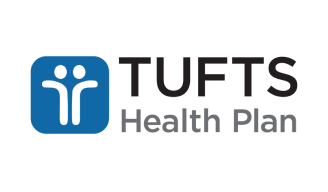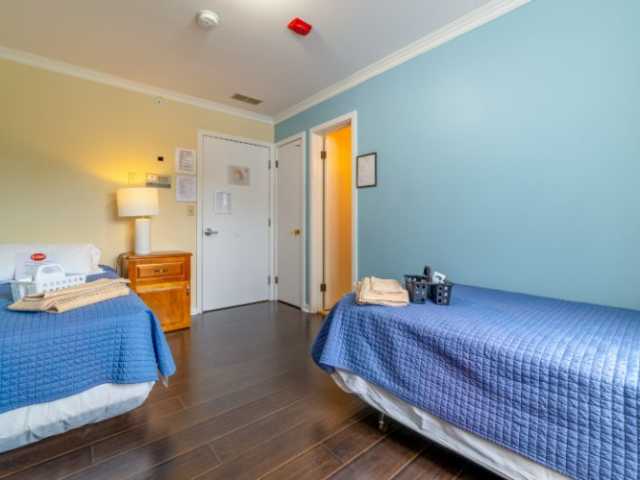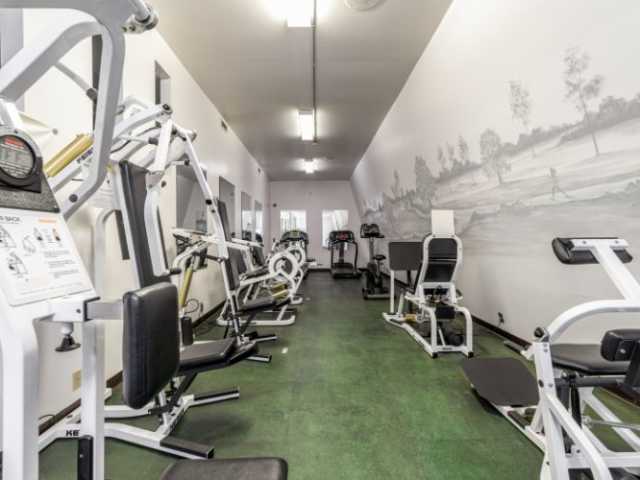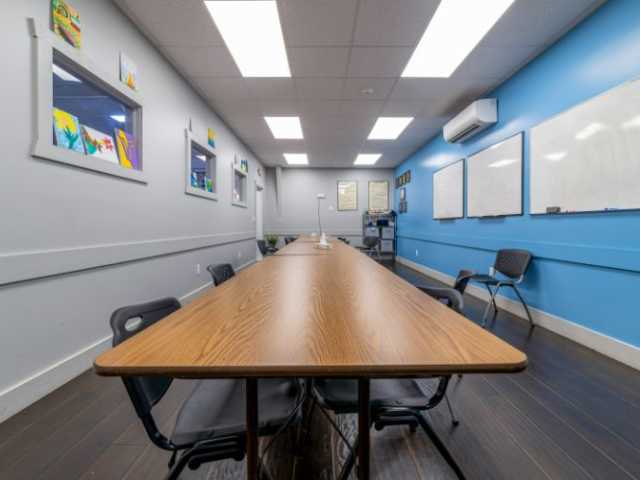Gilman, Illinois, United States
Banyan Heartland
Verified
Verified
This provider’s information has been quality-checked by Recovery.com’s Research Team for accuracy and completeness, including center verification through appropriate third-party organizations.
Joint Commission Accredited
The Joint Commission accreditation is a voluntary, objective process that evaluates and accredits healthcare organizations (like treatment centers) based on performance standards designed to improve quality and safety for patients. To be accredited means the treatment center has been found to meet the Commission's standards for quality and safety in patient care.
Provider's Policy
The goal of our Heartland drug abuse rehab is to make sure that people who struggle with substance abuse are able to get the help they need to live a sober life. We accept most insurance plans.
Estimated Cash Pay Rate
The cost listed here (Call For Rates) is an estimate of the cash pay price. Center pricing can vary based on program and length of stay. Contact the center for more information. Recovery.com strives for price transparency so you can make an informed decision.
About Banyan Heartland
Banyan Heartland provides medical detox and residential treatment for addiction and co-occurring mental health conditions. Their 33-acre campus was once a spa and offers a peaceful environment for recovery. Banyan Heartland uses evidence-based and holistic therapies to provide comprehensive treatment tailored to each client’s needs. Once clients complete residential treatment, they can seamlessly transition to Banyan Chicago’s outpatient facility for outpatient care.
A Full Continuum of Care
Banyan Heartland’s medical detox provides 24/7 monitoring and support. Their staff of physicians and nurses supervise the process for clients’ safety and comfort. Banyan Heartland’s residential program separates clients by gender. They invite family into recovery too, offering weekly family therapy, psychoeducation for loved ones, and intervention services. After detox and residential services, clients can transfer to nearby Banyan Chicago for day treatment, intensive outpatient, and outpatient services.
Evidence-Based, Clinically-Led Treatment
Banyan Heartland’s masters-level clinicians and therapists provide individual and group therapies, with daily groups and at least one 1:1 session each week. Their evidence-based therapies include cognitive behavioral therapy (CBT), dialectical behavioral therapy (DBT), eye movement desensitization and reprocessing (EMDR), biofeedback, art therapy, Gestalt therapy, family therapy, and more.
Dual-Diagnosis Recovery And Specialized Programs
Banyan Heartland addresses co-occurring mental health conditions throughout their levels of care, including depression, bipolar disorder, anxiety, obsessive compulsive disorder, and ADHD. They offer a specific trauma track with EMDR therapy and specialized group therapies. Banyan Heartland also provides a track for veterans and military members and an optional faith-based program. Their aftercare program provides ongoing support through continuous check-ins, help with the next steps in treatment, and peer recovery meetings.
Read More

Insurance Accepted
Provider's Policy:The goal of our Heartland drug abuse rehab is to make sure that people who struggle with substance abuse are able to get the help they need to live a sober life. We accept most insurance plans.
Safe, Medically Supervised Detox
Banyan Heartland offers 24/7 supervision for clients in detox. They create an individualized detox plan for each client, using medications for withdrawal as necessary. Clients receive chef-prepared meals and can enjoy Banyan Heartland’s on-site gym as they begin their recovery.
Personalized Recovery Experience
Banyan Heartland creates a unique treatment plan for each client. A thorough clinical assessment helps determine their individual needs and recovery goals. Clients can enjoy a broad range of treatment therapies, holistic activities, and wellness services to continuously meet their needs.
Evidence-Based And Holistic Therapies
Banyan Heartland uses evidence-based and holistic therapies for a well-rounded recovery experience. Depending on their individual treatment plan, clients may receive trauma-informed therapies, biofeedback, motivational interviewing, and more. They can also enjoy art therapy, recreational outings, an on-site gym, and walks along Banyan Heartland’s many nature trails.
Outpatient Care
After detox and residential care at Banyan Heartland, clients can transfer to Banyan Chicago for lower levels of outpatient care and extended support. There, clients can attend day treatment, intensive outpatient, and general outpatient programs. Banyan Heartland additionally offers telehealth services for greater flexibility.

Center Overview
Estimated Cash Pay Rate

Treatment Focus
This center treats primary substance use disorders and co-occurring mental health conditions. Your treatment plan addresses each condition at once with personalized, compassionate care for comprehensive healing.

Care Options








Treatment
Specializations
Alcohol
Using alcohol as a coping mechanism, or drinking excessively throughout the week, signals an alcohol use disorder.
Anxiety
Anxiety is a common mental health condition that can include excessive worry, panic attacks, physical tension, and increased blood pressure.
Detox
Detox fully and safely removes toxic substances from the body, allowing the next steps in treatment to begin with a clean slate.
Co-Occurring Disorders
A person with multiple mental health diagnoses, such as addiction and depression, has co-occurring disorders also called dual diagnosis.
Approaches
Evidence-Based
A combination of scientifically rooted therapies and treatments make up evidence-based care, defined by their measured and proven results.
Holistic
A non-medicinal, wellness-focused approach that aims to align the mind, body, and spirit for deep and lasting healing.
Medical
Medical addiction treatment uses approved medications to manage withdrawals and cravings, and to treat contributing mental health conditions.
Personalized Treatment
The specific needs, histories, and conditions of individual patients receive personalized, highly relevant care throughout their recovery journey.
Twelve Step
Incorporating spirituality, community, and responsibility, 12-Step philosophies prioritize the guidance of a Higher Power and a continuation of 12-Step practices.
Therapies
1-on-1 Counseling
Patient and therapist meet 1-on-1 to work through difficult emotions and behavioral challenges in a personal, private setting.
Meditation & Mindfulness
A practiced state of mind that brings patients to the present. It allows them to become fully aware of themselves, their feelings, and the present moment.
Online Therapy
Patients can connect with a therapist via videochat, messaging, email, or phone. Remote therapy makes treatment more accessible.
Mindfulness Therapy
This ancient practice can be mental, emotional, and even spiritual. In meditation, you focus your attention on the present moment without judgement.
Adventure Therapy
This experiential approach uses the physical and emotional challenges of outdoor activities as tools for personal growth.
Animal Therapy
Animals can inspire trust and self-worth. In this experiential therapy, guided interactions are used to improve social skills and emotion regulation.
Art Therapy
Visual art invites patients to examine the emotions within their work, focusing on the process of creativity and its gentle therapeutic power.
Equine Therapy
Guided interactions with trained horses, their handler, and a therapist can help patients improve their self-esteem, trust, empathy, and social skills.
Conditions We Treat
Anxiety
Anxiety is a common mental health condition that can include excessive worry, panic attacks, physical tension, and increased blood pressure.
Bipolar
This mental health condition is characterized by extreme mood swings between depression, mania, and remission.
Depression
Symptoms of depression may include fatigue, a sense of numbness, and loss of interest in activities. This condition can range from mild to severe.
Post Traumatic Stress Disorder
PTSD is a long-term mental health issue caused by a disturbing event or events. Symptoms include anxiety, dissociation, flashbacks, and intrusive thoughts.
Trauma
Some traumatic events are so disturbing that they cause long-term mental health problems. Those ongoing issues can also be referred to as "trauma."
Substances We Treat
Alcohol
Using alcohol as a coping mechanism, or drinking excessively throughout the week, signals an alcohol use disorder.
Benzodiazepines
Benzodiazepines are prescribed to treat anxiety and sleep issues. They are highly habit forming, and their abuse can cause mood changes and poor judgement.
Chronic Relapse
Consistent relapse occurs repeatedly, after partial recovery from addiction. This condition requires long-term treatment.
Co-Occurring Disorders
A person with multiple mental health diagnoses, such as addiction and depression, has co-occurring disorders also called dual diagnosis.
Cocaine
Cocaine is a stimulant with euphoric effects. Agitation, muscle ticks, psychosis, and heart issues are common symptoms of cocaine abuse.
Drug Addiction
Drug addiction is the excessive and repetitive use of substances, despite harmful consequences to a person's life, health, and relationships.
Ecstasy
Ecstasy is a stimulant that causes intense euphoria and heightened awareness. Abuse of this drug can trigger depression, insomnia, and memory problems.
Heroin
Heroin is a highly addictive and illegal opioid. It can cause insomnia, collapsed veins, heart issues, and additional mental health issues.
Psychedelics
Hallucinogenic drugs—like LSD—cause euphoria and increased sensory experiences. When abused, they can lead to depression and psychosis.
Aftercare
Experience
Personal Amenities
Amenities
Special Considerations
Pet Friendly
For greater comfort and healing, pet-friendly treatment centers welcome dogs and animal companions to stay with their owners while they attend treatment.
Gender-specific groups
Patients in gender-specific groups gain the opportunity to discuss challenges unique to their gender in a comfortable, safe setting conducive to healing.
Healthy Meals are provided
Great food meets great treatment, with providers serving healthy meals to restore nutrition, wellbeing, and health.
Activities
Yoga
Yoga is both a physical and spiritual practice. It includes a flow of movement, breathing techniques, and meditation.
Off-Site Activities
Off-Site Amenities
Professional Staff

Dr. Darrin Mangiacarne
Chief Medical Officer
MD

Jonelle Brennan
National Director of Admissions

Renee Ross
National Director of Case Management

Joni Beckham
National Director of Nursing
Accommodations
Food & Nutrition
Treatment
Value
Nora B
Jessica L
We love hearing about your treatment experience
Help individuals and families seeking treatment by sharing your first-hand experience with this treatment provider. Review Guidelines.








































